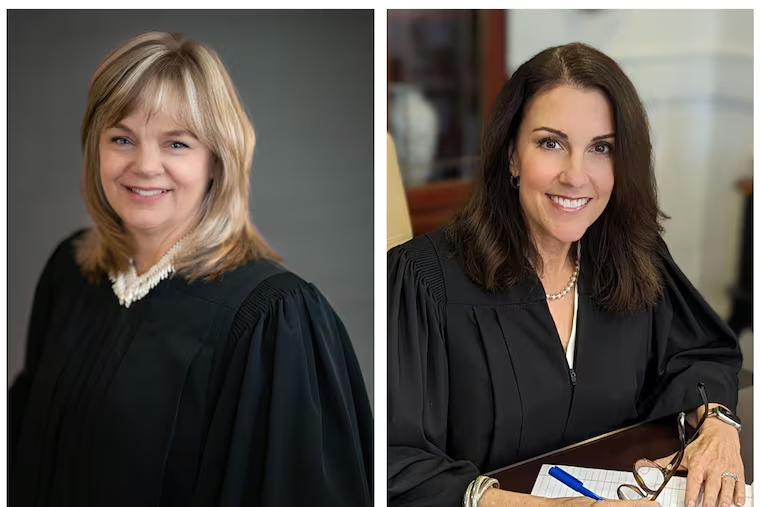Democrat Deborah A. Kunselman and Republican Carolyn Carluccio are best choice in Pa. Supreme Court primary | Endorsement
Elections are a bad way to select judges, but until the system changes, voters must choose. As the final word on many issues, the Supreme Court race is a critical contest.

Voters in the Tuesday primary will face a long ballot that will include several candidates running for judgeships. Unfortunately, most voters will know little to nothing about the judicial contenders.
Many will cast votes based on a name or ballot position. Many of the judicial candidates will have raised money from lawyers and corporate, union, and other special interest groups that may have business before the court.
Judges are called upon to be neutral and independent arbiters, yet they owe their position to their donors. The entire process underscores the absurdity of electing judges.
Indeed, most democratic countries do not elect judges. But in the U.S., Pennsylvania is one of 39 states where some or all of the judges are elected, casting a shadow of moneyed influence on the judicial system. Take, for example, the Wisconsin Supreme Court race this year, where more than $42 million was spent and which turned into a bitter political battle that had little to do with the impartial pursuit of carrying out justice.
While not perfect, there is a better way. New Jersey and a number of other states use a merit-based system to appoint judges. It’s a more informed process that removes the influence of money from elections. As a state representative, Gov. Josh Shapiro introduced a bipartisan proposal to switch to a system of appointing judges. Shapiro should continue to champion that cause.
» READ MORE: The Inquirer’s 2023 Endorsement Guide
Until then, voters are left to choose. There are races for Pennsylvania Supreme Court, the Superior Court, and the Commonwealth Court. Each county also has judicial elections for the Court of Common Pleas and Municipal Court.
This board did not believe it had enough information to make authoritative endorsements in all the judicial races. But the board did research and requested questionnaires from candidates running for the state Supreme Court.
This is an important race, as the high court is the final word on many issues, including rulings surrounding mail-in voting that go to the heart of democracy. The primary winners will face each other in November, where that winner will replace Max Baer, who died last year.
In the Democratic primary, the best choice is Deborah A. Kunselman, who has served on the bench longer than her opponent and has wide-ranging legal experience. Kunselman was the first woman elected to the Court of Common Pleas in Beaver County, where she served for 12 years. She was elected to the Superior Court in 2017, where she decided over 3,000 appeals.
Prior to becoming a judge, Kunselman spent 13 years as a private attorney, arguing cases in the Commonwealth and Superior Courts, and was the chief solicitor in Beaver County for eight years. Kunselman is not a strict constructionist or a judicial activist, and she stresses the importance of reaching a majority consensus with her judicial colleagues.
Kunselman, a mother of three who graduated from Penn State and Notre Dame Law School, believes treatment and rehabilitation should be a priority for criminal offenders who suffer from mental health disorders and drug addiction. She also wants to see juvenile justice reform and more people of color on the bench. Kunselman has the right experience and temperament for the high court.
Her opponent is Dan McCaffery, a former assistant district attorney in Philadelphia and a judge on the Philadelphia Court of Common Pleas before being elected to the Superior Court in 2019.
McCaffery, whose brother, Seamus, served on the Pennsylvania Supreme Court, has less experience and is more enmeshed in party politics. He did not respond to The Inquirer’s survey of candidates.
The best choice in the Republican primary is Carolyn Carluccio, the first female president judge in the Montgomery County Court of Common Pleas.
Carluccio, who was first elected in 2009, is a constitutional originalist who models herself after the late U.S. Supreme Court Justice Antonin Scalia. She supports long sentences for violent offenders, especially those who commit crimes with guns.
A graduate of Widener University Law School, Carluccio worked as a public defender in Montgomery County and was an assistant U.S. attorney.
Most of Carluccio’s conservative views do not align with those of this board. She has also made troubling comments about wanting to rework Act 77 — the 2019 law that expanded mail-in voting — and gave a muddled response to The Inquirer when asked if the state’s 2020 and 2022 elections were free and fair. However, in the Republican primary, Carluccio remains the better choice.
Patricia McCullough, her opponent, serves on the Commonwealth Court in Allegheny County. McCullough, who did not respond to The Inquirer’s endorsement survey, was front and center in the effort to challenge the outcome of the 2020 presidential election. She issued an unprecedented injunction to halt the certification of the election, which the state Supreme Court unanimously overturned.
McCullough recently spoke at a political rally hosted by State Sen. Doug Mastriano, the far-right election denier and supporter of Donald Trump who also marched with the Jan. 6, 2021, insurrectionists.
Anyone still riding the Trump train is not qualified to hold public office.
Editor’s Note: An earlier version of this editorial misidentified the judge who unsuccessfully challenged Kevin Brobson for the Republican nomination for the state Supreme Court in 2021. It was Patricia McCullough.